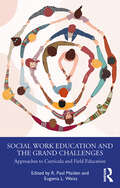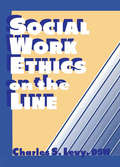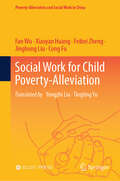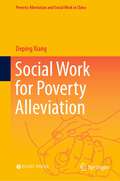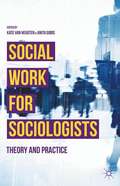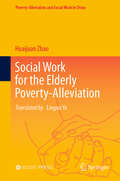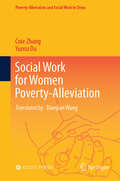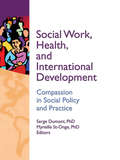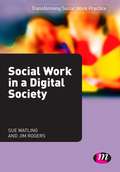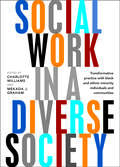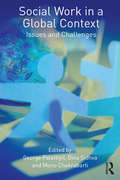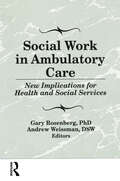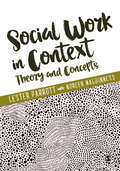- Table View
- List View
Social Work Education and the COVID-19 Pandemic: International Insights toward Innovation and Creativity (Routledge Research in Education)
by Yael Latzer Liat ShklarskiThis book examines how the shift to remote teaching in March 2020 due to the global pandemic created new opportunities for innovation and creativity and shaped how social work classes were taught, with many temporary changes now part of permanent, standard practice. Drawing on narratives from 20 social work leaders across 17 different countries, the chapters explore particular themes and viewpoints on lessons learned during the pandemic, including case studies to examine copying mechanisms, insights into the transition to remote teaching, and the creative lessons that were learned. By taking an international perspective, it represents a key contribution to the scholarship of social work leaders from around the world concerning how institutions transitioned to remote learning and teaching and how these lived experiences and new discoveries are contributing to and influencing current practice. As such, it will appeal to social work educators, researchers, and field educators around the world with interests in experimental curriculum and field practice.
Social Work Education and the Grand Challenges: Approaches to Curricula and Field Education
by R. Paul Maiden Eugenia L. WeissThe Grand Challenges for Social Work (GCSW) provides an agenda for society, and for the social work profession. The 13 GCSW have been codified by the American Academy of Social Work and Social Welfare and are emerging as a significant underpinning in the education of undergraduate and graduate social work students throughout the USA. This volume serves as a guide as to how this can best be achieved in alignment with the 2022 Educational Policy and Accreditation Standards (EPAS) from the Council of Social Work Education. Divided into four parts: • Individual and Family Well-Being; • Stronger Social Fabric; • A Just Society; • The Grand Challenges in the Field. Each chapter introduces a Grand Challenge, situates it within the curricula, and provides teaching practices in one of the targeted domains as well as learning objectives, class exercises, and discussions. By showing how to facilitate class discussion, manage difficult conversations, and address diversity, equity, and inclusion as part of teaching the topic, this book will be of interest to all faculty teaching at both undergraduate and graduate levels. It should be noted that there are additional supplementary chapters beyond the 13 GCSW that provide further context for the reader.
Social Work Education and Training
by Joyce LishmanExcellent social work education and training is vital for ensuring best practice, and it is important to understand the key approaches and methods in order to provide the best teaching and ensure effective learning. This volume provides an overview of social work education, including the background and current context. It covers the key debates surrounding social work education, such as the evaluation of social work education, the use of IT, research-mindedness, and the effectiveness of interdisciplinary education. The book also offers guidance on effective teaching and learning approaches tailored to the needs of social work educators, covering teaching within a higher education institution, on student practice placements, and in post-qualifying settings. This will be an indispensable text for educators and trainers in the field of social work.
Social Work Education in Europe: Traditions and Transformations (European Social Work Education and Practice)
by Nino Žganec Marion LagingThis contributed volume provides an in-depth overview of current social and socio-political transformations in Europe and their effects on social work and its educational structures. It elucidates these transformations and structures at the individual level of ten different countries and goes on to elaborate a European perspective in this field. Readers gain insight into the variety in social work and its educational structures in Europe and, at the same time, readers receive starting points for the exchange of ideas, collaboration and further development in the individual countries and in Europe. The introduction outlines the current developments and challenges facing social work education in Europe, contextualizing the topics to be covered in the volume. Each chapter offers an individual country profile of social work, including an analysis of typical examples of different traditions of educational models for social work that, collectively, provide insight into an overall "European model of education for social work". The countries selected represent all parts of Europe:FinlandLatviaGermanyUnited KingdomThe NetherlandsFranceItalyCroatiaRomaniaCyprusEuropean Social Work Education: Traditions and Transformations is an essential resource – an up‐to‐date and differentiated inventory of social work education in Europe from a horizontal and vertical perspective – which describes fields of work and approaches that prepare students to practice social work, examines the degree of academization of the discipline and investigates its structures and conditions. Social workers and social work educators, researchers and practitioners will find this an engaging and useful text.
The Social Work Ethics Casebook: Cases and Commentary
by Frederic G. ReamerThis is the first ethics casebook, including extensive cases and commentary, published exclusively for social workers. The book's realistic ethics cases provide a useful tool for rich discussion of ethical dilemmas and ethical decision making. Following each set of cases, Reamer includes commentary highlighting key ethics concepts and references to relevant standards in the NASW Code of Ethics. <p><p>The release of Social Work Ethics Casebook highlights ethical issues related to confidentiality and privacy, informed consent, client self-determination, professional paternalism, boundary issues and dual relationships, conflicts of interest, cultural and ethnic diversity, termination of services, administration, collegial impairment, commitments to employers, social work education and training, and more. Each section of the book also includes discussion questions designed to enhance readers understanding and application of important ethics concepts.
Social Work Ethics on the Line
by Simon Slavin Charles S LevySocial Work Ethics on the Line discusses social work ethics in-depth and the process of making ethical judgements in social work practice. This much-needed book guides social workers through ethical dilemmas and assists them in their exercise of professional discretion without exclusive reliance on the codes of professional ethics to which they are committed. The author proposes a method to lead social workers through making ethical decisions which enables them to evaluate decisions in actual practice and in the adjudication of grievances and complaints of unethical conduct. This method is fully demonstrated in twenty-four vignettes representing situations commonly encountered by social workers in a variety of professional and educational situations. Raising the ethical consciousness of social work practitioners, trainees, and students, this book helps them develop the awareness and skills necessary for choosing ethical actions in their work. Social Work Ethics on the Line is an invaluable guide for social work practitioners, supervisors, administrators, and community organization workers. It is also helpful for in-service training in social agencies and undergraduate and graduate schools of social work.
Social Work Fields of Practice
by Catherine N. Dulmus Karen M. SowersA contemporary look at social work practice and the many career possibilities-with detailed coverage of important new and emerging trendsAs the practice of social work continues to diversify, students need a clear picture of the current state of the field and an up-to-date source of information and guidance on emerging career opportunities. Social Work Fields of Practice provides both.Written by a team of experts in their respective specialties, this book features a comprehensive overview of contemporary social work practice, discussing historical trends and demographics, professional issues, ethics, and diversity for each practice area. Both traditional areas and new fields are considered from a variety of perspectives, including the clinical, ethical, cultural, legal, theoretical, and technological.Addressing the Council on Social Work Education's required competencies for accreditation (EPAS), Social Work Fields of Practice contains pedagogical features such as Key Terms, Review Questions for Critical Thinking, and Online Resources. It is the most timely, all-encompassing resource of its kind, covering:Child welfareFamily-centered practiceSchool social workSubstance abuseMental healthSocial work disability practiceGerontological social workForensic social workVeterinary social workMilitary social workInternational social workSocial work practice with immigrant and indigenous populationsWith expert, in-depth discussions of the most important specialties and practice environments for today's social worker, Social Work Fields of Practice is an invaluable resource for undergraduate and graduate students preparing to enter this noble profession, as well as social workers seeking to expand their professional horizons.
Social Work for Child Poverty-Alleviation (Poverty-Alleviation and Social Work in China)
by Fan Wu Xiaoyan Huang Feibei Zheng Jinghong Liu Cong FuThis book is to reflect on the achievements and challenges of current poverty-alleviation practices for children in China, in order to understand and clarify the function, intervention strategies and development direction of social work in child poverty-alleviation. It systematically presents the theoretical framework and practical path of social work in child poverty-alleviation. The book has three main focuses: firstly, it reviews the theoretical analysis framework of social work in child poverty-alleviation, such as social development perspective, social integration perspective and ecological systems theory at a macro-level, as well as life course theory and resilience theory at a micro-level; secondly, it presents the general practice path of social work in child poverty-alleviation from the perspective of practice framework, intervention path, work procedures and specific methods, exploring the key points, difficulties, methods and techniques of social work intervention in child poverty-alleviation practices through local cases in China; thirdly, based on the international social work experience in child poverty-alleviation and combined with local practices in China, it clarifies the future direction and advantages of social work in child poverty-alleviation in China.
Social Work for Poverty Alleviation (Poverty-Alleviation and Social Work in China)
by Deping XiangThis book studies poverty issues by using social work theories and methods. It illustrates the values, theories, elements, contents, and processes of anti-poverty social work, summarizes the development of China’s anti-poverty policies, and explores the models and methods of anti-poverty social work in China. This book represents the research results of the National Social Science Foundation Project “Research on Dynamic Monitoring and Effectiveness Evaluation of the Implementation of Targeted Poverty Alleviation Strategy” (16ZDA022) and China’s Ministry of Education’s Philosophy and Social Science Development Construction (Incubation) Project Report “Anti-Poverty Development Report in China” (11JBGP038).
Social Work for Sociologists: Theory and Practice
by Kate Van Heugten Anita GibbsIn Social Work for Sociologists, a team of international authors with backgrounds in social work and sociology explain and illustrate how "the social work imagination" links theory and practice to interventions and outcomes. Van Heugten, Gibbs, and contributors address lingering disciplinary divisions and controversies about the appropriateness of engaging with public issues and social justice concerns, and introduce key values, ethics, and practice frameworks. Finally, they illustrate theutility of social work practice frameworks in fields including child welfare, group work, bicultural and multicultural practice, community work, workplace mobbing, and research.
Social Work for the Elderly Poverty-Alleviation (Poverty-Alleviation and Social Work in China)
by Huaijuan ZhaoThis book focuses on how to provide social work services for elderly people living in poverty. Divided into eight chapters, the book first outlines the scale, characteristics, and causes of poverty among elderly people and discusses the significance of social work in poverty alleviation for the elderly. The book then concentrates on different types of elderly people, such as those in economic and ecological poverty, and those suffering from poverty caused by illness, disability, and lack of ability, analyzing the content and service modes and providing case studies. Finally, the book discusses ways and strategies for social work participation in poverty alleviation for the elderly in the post-poverty alleviation era. This book combines theory with practice and is a useful reference for government departments, universities, as well as social organizations related to social work.
Social Work for Women Poverty-Alleviation (Poverty-Alleviation and Social Work in China)
by Cuie Zhang Yunsu DuThis book comprehensively applies social gender theory, life course theory, and spatiotemporal sociology theory to explore social work actions for poverty alleviation among women based on empirical investigations and social work practice. Taking impoverished women as the research object, this book analyzes the characteristics and difficulties of women's poverty and poverty alleviation from the vertical dimension of life course as well as from the horizontal dimension of social space Meanwhile, taking impoverished women as the service object, it systematically sorts out the main modes of social work for women’s poverty alleviation, presents classified cases of social work for poverty reduction targeting rural women in different life stages, and summarizes the main problems in the practice of social work for poverty alleviation.
Social Work, Health, and International Development: Compassion in Social Policy and Practice
by Serge Dumont Myreille St-OngeSharpen your social work in health care knowledge and skillsSocial Work, Health, and International Development: Compassion in Social Policy and Practice presents leading international experts from a range of disciplines providing the latest in research, theory, and practical solutions to advance social work in health care issues. Readers get a refreshed view on ways to put social policy into a compassionate and empathetic framework with strategies to more effectively meet today's challenges in social work and health care. This superb selection of papers from the Fourth International Conference on Social Work in Health and Mental Health held in Quebec provides a unique perspective on social work and the development of a more compassionate world.Social Work, Health, and International Development: Compassion in Social Policy and Practice focuses on areas essential to every social worker no matter where they practice. The book explores the increased importance of compassion and solidarity among social workers, the essential need to effectively address the HIV/AIDS pandemic, strategies to more fully address aging issues, and best practices. The latest research findings and data are discussed to modify approaches and revitalize the field, all to help the world become a more caring, compassionate place.Topics in Social Work, Health, and International Development: Compassion in Social Policy and Practice include: social work interventions to lead needy countries from health to economic growth the concept of solidarity as a fundamental notion in social work the need to revisit social work’s ethical foundations cultural competence in responding to the HIV/AIDS pandemic a comprehensive action plan to deal with HIV/AIDS a study on grandparents’ caring for children of AIDS victims multilevel interventions to promote elderly people’s mental health forming partnerships that promote the diverse voices of older people recognizing deficiencies to increase cultural competency in staff “best practice” case management approach to improve patient adherence to care Internet-based intervention for caregivers of persons with dementia dyadic peer support pilot intervention for parents of children with lung disease continual education for increased professional competence much more!Social Work, Health, and International Development is invaluable reading for social workers, health practitioners, researchers, and clinicians.
Social Work Health and Mental Health: Practice, Research and Programs
by Steven P. SegalRise to today’s challenges with these innovative and helpful value-based solutions!Containing important, research-based insights into social work practice in these fields, Social Work Health and Mental Health Practice, Research and Programs provides unique perspectives on shared practice problems from around the world, offering new solutions to the dilemmas practitioners face every day, such as reduced reliance in inpatient/residential service provision, increased reliance on economics in the era of managed care, the move toward multidisciplinary service provision, the growing awareness of diversity of needs, and the cultural requirements of providing effective services.Social Work Health and Mental Health Practice, Research and Programs provides unique international perspectives on real-world social work practice issues, including: ways to use your social work skills to solicit organ/tissue donation for transplants how a social work directed community organization affected change in health behaviors in East Harlem, New York a look at how to promote psychosocial well-being following a diagnosis of cancer a survey of what mental health services Hong Kong elderly feel they need and what they now receive an examination of the role of demographics and social support in clinician- and patient-related compliance among HIV/AIDS patients a discussion of the appropriateness of hospice services for non-English speaking patients and much more!
Social Work, Housing, and Homelessness (Student Social Work)
by Robert Hagan Anya AhmedShelter is a basic human requirement, yet housing in the UK has increasingly been perceived as an asset rather than the secure base everyone requires for their basic physical and mental health needs and well-being.This book examines how all types of housing have become precarious for many service users with whom social workers will engage and makes some suggestions regarding action and best practice. Showing how people become homeless and the difficulties finding a way out of this, the housing options for specific populations including care leavers, those with disabilities, families, and older people will be examined. All this will be framed in the context of social work practice, building practitioner knowledge and confidence around an area that affects everyone but the significance of which is sometimes underexamined in holistic assessments. Packed with reflective examples and case studies, each chapter also includes a "tuning in" exercise to help prepare the reader for what the chapter will tackle, with concluding thoughts on these exercises at the chapter end.This book is suitable for both undergraduate and postgraduate social work students as they begin to think of more specialised areas of work in their second or subsequent years, as well as social work practitioners, who will be increasingly aware of the pressures of housing costs on those with whom they work.
Social Work, Immigration and Asylum: Debates, Dilemmas and Ethical Issues for Social Work and Social Care Practice
by Chris Brown Beth Humphries Debra HayesThe practical and ethical challenges facing human service professionals working with refugees, asylum seekers and other people subject to immigration controls are discussed in this much-needed book. The contributors explore the tensions that exist between traditional anti-oppressive values and the role professionals increasingly play as 'gate keepers' to services. Drawing from the experience of practitioners working in child protection and family support, disability, the criminal justice system, asylum teams and immigration tribunals, Social Work, Immigration and Asylum will prepare professionals working in these and related fields to deal with the complex situations of people subject to immigration control and to develop interventions appropriate to their differing needs.
Social Work in a Changing Scotland (Student Social Work)
by Viviene E. Cree Mark SmithScotland has changed, politically and culturally, in recent years, with persistent demands for independence culminating in a referendum in 2014. On this fluid political landscape, social welfare can be co-opted towards a wider ‘nation-building’ project. As a result, social work in Scotland is increasingly divergent from the rest of the UK. This book offers a comprehensive, critical and timely account of the profession in these changing times, charting its historical development, current practice and future directions. Bringing together a range of academic and practice experts, it considers social work as it is currently but also as it might be. Divided into three parts, the first part sets a context, identifying historical, philosophical, policy and legal influences on current practice. The second part picks up on current themes in policy and practice, addressing key issues of professional identity in an increasingly integrated policy context. The final part contains chapters on current domains of practice, identifying key areas of legislation, policy and practice. Social Work in a Changing Scotland is essential reading for social work students, offering an accessible yet critical overview of the profession. It will also inform current practitioners to understand better the changing contexts within which they practise, while prompting further academic debate about Scottish social work.
Social Work in a Digital Society (Transforming Social Work Practice Series)
by Sue Watling Mr Jim RogersThis book will help students develop their understanding of how the internet is impacting on social work education and practice in 21st century. Essential reading for students interested in the influence of digital technology and social media, including the impact of digital divides, this book looks at how the value-base of social work can have a positive effect on service users and carers who engage with digital services.
Social Work in a Diverse Society: Transformative Practice with Black and Minority Ethnic Individuals and Communities
by Charlotte Williams and Mekada J. GrahamThe gap between the theory and the practice of working with Black and minority ethnic groups presents an ongoing conundrum for social work. This exciting textbook presents a new theory based on a rich understanding of the constraints and creativities of practice. Taking a transformative approach, this accessible textbook presents evidence from both academics and practitioners. Contributions draw on real-life practice scenarios and present case studies to illustrate the many dimensions of working in a diverse society, encouraging students and practitioners to form innovative solutions to service delivery. Covering practice themes including risk, co-production, interpreting, multi-disciplinary working and personalisation, this is vital reading for all students in social work, and practitioners undertaking continuing professional development.
Social Work in a Global Context: Issues and Challenges (Routledge Advances in Social Work)
by George Palattiyil Dina Sidhva Mono ChakrabartiSocial Work in a Global Context engages with, and critically explores, key issues that inform social work practice around the world. Social work can take many forms, and is differently understood in different parts of the world. However, at base, it can be seen as a profession which strives to advance the causes of the vulnerable and marginalised with the aim of promoting social justice, equality, and human rights. This text provides examples of social work in a wide range of countries, informing our understanding of what social work is. It looks at how practice changes or stays the same, and at the impact of policy, as experienced by service users as well as by practitioners working in challenging circumstances. It also meaningfully reflects on the strengths and challenges that are enabled by diversity. Divided into four parts, this wide-ranging text discusses: - what social work means in four different countries -some examples of the impact social and political context can have on social work practice - how social workers see and work with the vulnerable - the future for social work, from disaster work to involving service users. Social Work in a Global Context is the first truly international book for all those interested in comparative and cross-cultural understandings of social work.
Social Work in a Glocalised World (Routledge Advances in Social Work)
by Mona Livholts Lia BryantThis engaging and timely volume contributes new knowledge to the rapidly emerging field of globalisation and social work. The volume brings together cutting-edge interdisciplinary scholarship from countries such as Australia, Finland, Japan, South Africa, the Philippines and Sweden. It proposes ‘glocalisation’ as a useful concept for re-framing conditions, methodologies and practices for social work in a world perspective. Part I of the volume, 'The Glocalisation of Social Issues', deals with major environmental, social and cultural issues – migration and human rights, environmental problems and gendered violence. Part II, 'Methodological Re-Shaping and Spatial Transgression in Glocalised Social Work', develops an epistemology of situated knowledge and methodologies inspired by art, creative writing and cultural geography, focusing on physical, material and emotional spatial dimensions of relevance to social work. Part III, 'Responses from Social Work as a Glocalised Profession', examines how social work has responded to specific social problems, crises and vulnerabilities in a glocalised world.
Social Work in Ambulatory Care: New Implications for Health and Social Services
by Gary RosenbergThe contributing authors of this volume--respected authorities on health care and social work--describe the shift from hospital based care to ambulatory patient and family focused community based services. Social Work in Ambulatory Care assists readers who need to develop, plan, and implement new social work roles for a changing health care system. Chapters focus on the implications of health care reform, based on policy or economic mandates, and provide specific examples of how social service providers can approach health care in a new era.As the authors describe the shift in health care to ambulatory care and the role of social work in this new environment, they cover areas of potential concern to social service providers. Readers will be challenged to plan new social work roles in the future--roles that help advance social work’s own definitions of health and wellness. Specific examples of creative roles for social work are described and several of the most important areas this guidebook analyzes are: the health care system under siege support groups managed care emergency room community based careFor social workers in health settings, struggling with the questions of relevance, growth, and worth in a changing environment, Social Work in Ambulatory Care provokes new ideas about health care for the future.
Social Work in Context: Theory and Concepts
by Noreen Maguinness Mr Lester ParrottThis book examines key sociological theories that have contributed to the understanding of the nature of social work, its organisation and delivery. It provides key sociological concepts and theories to help student social workers better understand the nature of their work and the social and political context within which they will be working. Taking a practical approach to social work, and focusing on the application of theory, the book also provides insightful discussions to important thinkers such as Douglas, Beck and Furedi, and how their ideas have direct relevance for understanding the risk averse nature of social work.
Social Work in Context: Theory and Concepts
by Noreen Maguinness Mr Lester ParrottThis book examines key sociological theories that have contributed to the understanding of the nature of social work, its organisation and delivery. It provides key sociological concepts and theories to help student social workers better understand the nature of their work and the social and political context within which they will be working. Taking a practical approach to social work, and focusing on the application of theory, the book also provides insightful discussions to important thinkers such as Douglas, Beck and Furedi, and how their ideas have direct relevance for understanding the risk averse nature of social work.
Social Work in East Asia
by Christian AspalterOwing to rapid economic development and the onset of population ageing, social work has become a major means of delivering social services and relieving and preventing social problems at an individual, family, and community level in East Asia. In addition to this, the number of activities undertaken by social welfare NGOs has risen a great deal throughout East Asia, resulting in a greater demand for professional social workers. With governments across the region having discovered the beneficial effects of professional social work for both social integration and social harmony, there is now greater support for the development of this academic discipline and profession. This groundbreaking volume explores the current state of development of social work provision across the region. It is the first book of its kind to investigate current and future trends, as well as the challenges and pitfalls of social work - one of the fastest-growing professions in East Asia.

